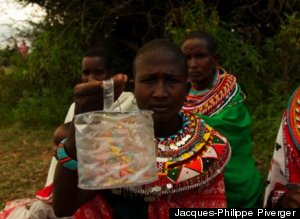Light. It's something many of us in the developed world take for granted. We simply flip a switch and our homes, offices, hospitals, and schools are flooded with light, enabling us to lead safe, productive, and healthy lives. But for the 1.5 billion people who live in energy poverty - with no access to modern energy services - life is very different.
Energy & Development
According to United Nations Secretary-General Ban Ki-moon, "Achieving sustainable energy for all is not only possible, but necessary. It is the golden thread that connects development, social inclusion and environmental protection." Access to energy is fundamental for economic and social development. It has tangible impacts on each of the UN's Millennium Development Goals (MDGs), which were established as a "promise to free people from extreme poverty and multiple deprivations."

Energy contributes to the eradication of poverty by increasing productive hours and reducing dependence on costly kerosene. It improves access to education by allowing children to study at home during dark evening hours. Portable energy devices increase the safety of women, girls and children walking in dark or remote areas and can reduce rates of violence. In 2012 I went to rural parts of Haiti on five occasions. On one such visit the Energy Minister of Haiti mentioned that after the introduction of lights in a particular tent community the rate of violent crime dropped from 57 incidences per week to only 2 weekly. I would argue that this value cannot be quantified. From an environmental perspective, clean energy sources reduce the CO2 emissions produced by non-renewable fuels while also reducing deforestation.
When it comes to improving global health, the significance of energy cannot be overstated. According to the United Nations Development Program, about three billion people still rely on burning solid fuels, such as biomass or coal, for household energy. Abandoning these dangerous traditional methods will improve the health and quality of life of billions, especially women and children. Additionally, many medical clinics across the developing world operate without electricity, and mortality and disease rates tend to be higher. Access to affordable lighting will drastically improve the standard of medical care and reduce mortality rates in poor or remote areas of the world. "Energy is a critical enabler for primary health care services, especially maternal and childbirth emergencies," says Kandeh K. Yumkella, Special Representative of the UN Secretary-General, in a recent article. "I talked to a young woman who had given birth at home in the dark, instead of at the health clinic," he explains. "...she said that the clinic had no electricity, and she didn't have the money to buy a candle."
Combatting energy poverty - especially as the MDG 2015 deadline approaches - is an urgent matter. In recent years several major initiatives have been launched, including a UN Decade of Sustainable Energy for All that begins in 2014. A global goal has been set for ensuring universal access by the year 2030. Yesterday and today I'm attending the Social Good Summit which is using the Twitter handle: #2030NOW. Already will.i.am, Bahareh Seyedi, Dave "Phoenix" Farrell and Rob Bourdon of Linkin Park, Pete Cashmore, and former Vice President, Al Gore have spoken about sustainability, climate change and energy poverty. This is the challenge of our time and we must rise to the occasion. Vice President Gore made a great reference to our placing the first person on the moon in 1969 based on a challenge that was articulated by President Kennedy in 1961. The average age of the Nasa scientists in the control room at the time was 26. This may seem exceptional, but history contends that the youth have always answered the biggest challenges of the day. The global epidemic of energy poverty will be no exception.
Social Entrepreneurship and Energy
Social entrepreneurship, which resides at the intersection of business and societal development, is changing the way we approach energy poverty. Innovations that provide low-cost and sustainable solutions are directly impacting the lives of the most vulnerable among us. By wielding our market power along with cutting-edge technologies, we in the social innovation field are using business to create significant global change. At MPOWERD Inc., for example, we do good by doing well. MPOWERD is tackling energy poverty by making our solar energy solutions accessible to people worldwide. Luci, our first born, is an inflatable, solar-powered lantern. In places where energy services are inaccessible - whether due to deficient infrastructure, high costs, or emergency conditions - Luci is a dependable source of light.
Solar power is a resource with extraordinary potential for the world - especially its poorest residents. By harnessing the sun's infinite and clean energy, developing countries can even leapfrog over the conventional dirty sources. Social entrepreneurs are playing a critical role in eradicating energy poverty. By moving away from "business as usual", we are finding new ways to incorporate poor communities into markets, combine business and philanthropy, and provide affordable and life-changing products.
The power of solar energy extends beyond just the brightness of a lantern or panel. It is delivering justice to the marginalized or impoverished. Energy is empowerment. It's a catalyst for development. And it's the force that will ultimately change the world. The key is that we collectively rise to the occasion making energy poverty a thing of the past in short order.